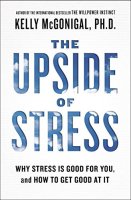
The Upside of Stress by Kelly McGonigal

Read the summary below and get the key insights in just 10 minutes!


- How your body’s stress responses function,
- How your beliefs about stress influence its effects and
- How to use stress to boost performance.

Negative and Positive Stress
Most health experts preach that stress is dangerous. Learn to manage your stress, they say, or invite such consequences as heart disease, depression and addiction. These experts say that managing stress means reducing it, either through relaxation techniques or by reorganizing your life to lessen the pressures affecting you.
Recent research undermines that conventional wisdom. One study surveyed 30,000 American adults on the stress in their lives and tracked the group’s mortality rates for eight years. The results were surprising. Those who led low-stress lives and those who led high-stress lives – but who didn’t think the stress was bad for them – had almost identical mortality rates. A third subgroup – highly stressed people who believed their stress was harmful – had a 43% higher risk of dying. Attitudes about stress appear to be more significant than the stress itself.
“The latest science reveals that stress can make you smarter, stronger and more successful.”
Three decades of research suggest that stress also offers rarely recognized benefits. These findings show stress can make you smarter, more confident and more empathetic. Stress can even improve your health. The best way to manage stress is not to fight it, but to embrace it.
“Many of the negative outcomes we associate with stress may actually be the consequence of trying to avoid it.”
How Stress Earned Its (Bad) Reputation
In the 1930s, Hungarian endocrinologist Hans Selye experimented with rats to test the effects of stress on the body. When he injected rats with a cow hormone, they developed bleeding ulcers and their immune systems failed. He subsequently injected rats with other substances, and they developed the same symptoms. Selye decided the experience of undergoing the injections – the stress – triggered the negative response. Taking his findings a step further, he theorized that life events affect people similarly.
Ever since, researchers have transferred results of animal studies to humans. But most studies examine the results of extreme stress, such as restraining a rat in a tiny container or forcing it to swim until it nearly drowns. The results may be applicable to people who have endured abuse, but most people’s daily stresses are not as severe or capricious.
“Stress is what arises when something you care about is at stake.”
Evolutionary Stress Responses
One explanation of the modern aversion to stress is the “mismatch theory.” It contends that humanity’s primitive ancestors evolved the stress response in an environment far more dangerous than today’s civilized workplaces. Humans’ evolutionary responses no longer match their daily reality. The ancient fight-or-flight response – wherein stress provokes an accelerated heartbeat, tightened muscles and the release of adrenaline – impelled early humans to either flee a predator or charge into battle. The mismatch theory recognizes only this kind of stress response, but evolution has not stood still. Human beings have developed a range of responses beyond fight-or-flight, including the following:
“Whatever the sensations of stress are, worry less about trying to make them go away, and focus more on what you are going to do with the energy, strength and drive that stress gives you.”
- “The challenge response” – Your body is smart enough to distinguish between a lunging lioness and a looming deadline. When you face a nonlethal threat, the body can initiate the challenge response, a mix of hormones that boosts confidence, focus and motivation. You come out of these stress experiences feeling more assured and self-reliant.
- “The tend-and-befriend response” – This response stimulates the release of oxytocin, a hormone that promotes emotional connections to others. It suppresses the flight instinct, giving you the courage to face the source of your stress. You become more likely to seek others’ support and to offer your support to them. Oxytocin is heart-friendly, helping the organ regenerate cells and repair “micro-damage.”
Stress as a Resource
The latest science indicates that, far from being a toxic goad, stress can become a valuable resource in difficult moments. The stress response enhances performance. Under stress, businesspeople hold more successful negotiations, students do better on tests, athletes become more competitive, surgeons improve their dexterity and pilots handle simulated emergencies more effectively.
“Adopting a more positive view of stress reduces what we usually think of as stress-related problems and helps people thrive under high levels of stress.”
A study of car-crash survivors found that those who recovered most quickly had the highest levels of stress hormones after the accident. They were also less likely to develop post-traumatic stress disorder (PTSD). Doses of stress hormones may turn out to be an effective therapy for PTSD.
“The best way to manage stress isn’t to reduce or avoid it, but rather to rethink and even embrace it.”
How can a stress response be a resource in your daily life? Imagine you are about to give a speech. If you’re like most people, you experience the physical symptoms of nervousness: dry mouth, sweaty palms and an accelerated heartbeat. Conventional wisdom says you won’t perform well unless you find a way to calm down and tame that anxiety. But if you dampen that stress, you’re cutting yourself off from a powerful ally. The symptoms you interpret as anxiety are actually the result of a challenge response. You feel more focused. Your brain processes information faster. The world even looks brighter – because your pupils have dilated.
If you let the challenge response do its work, you will approach your speech feeling “excited, energized, enthusiastic and confident.” Contrary to popular belief, great artists, athletes and surgeons are not psychologically calm; they draw on the resources of the challenge response to perform at their peak.
“In many ways, the stress response is your best ally during difficult moments – a resource to rely on rather than an enemy to vanquish.”
In some instances, you may perform extraordinary feats. For instance, two teenage girls in Oregon mustered the “hysterical strength” to lift a 3,000-pound tractor off their trapped father. You may find wellsprings of courage to defend your family, your company or your community or to conquer your fear of flying. While not always as spectacular as displays of hysterical strength, acts of courage can and do yield significant consequences.
“Unlike what most people believe, there is no one uniform physical stress response that is triggered by all stressful situations.”
Stress arises only in situations that involve something that is important to you. By pursuing your values, you inevitably encounter stress. Don’t interpret stress as a sign that something is wrong. You wouldn’t expect to reach a big goal, like climbing Mt. Everest, without encountering stress. You accept that hardships are part of the challenge, and you face them because you value the goal. You won’t feel like a failure because you’re exhausted from the cold or anxious about scaling yet another ice mass. You’ll see stress as a sign of failure only when you avoid it, not when you use it.
Avoid Avoidance
Research suggests that trying to avoid stress may be more harmful to your health and emotional well-being than stress itself. In a Japanese study, students who tried to dodge stress experienced a diminished sense of community. In Zurich, those students who tried hardest to avoid pressure reported a loss of focus, vitality and discipline. A US Department of Veterans Affairs study tracked more than 1,000 adults for a decade. Those who said they tried to avoid stress reported more incidents of depression, increased discord at home or on the job, and more negative outcomes, such as divorce.
“Feeling burdened rather than uplifted by everyday duties is more a mind-set than a measure of what is going on in your life.”
Those who try to avoid stress concentrate on dulling the discomfort rather than dealing with its source. They might use unhealthy means of escape, like alcohol. They also may isolate themselves from relationships or withdraw from their careers to avoid the pressure. Such avoidant behavior increases stress and robs people of resources they could use to handle the stress instead.
“Choosing to view anxiety as excitement, energy or motivation can help you perform to your full potential.”
When you avoid stress, you miss the opportunity for “stress inoculation,” in which you lose your sensitivity to the stress stimulus. Every time you face up to a stressful experience, you learn from it. You subtly rewire your brain so you know how to handle similar situations in the future, and you don’t re-experience stress every time such situations arise. This is why astronauts, emergency workers and athletes practice their skills under simulated stressful conditions.
Accepting Stress
The best way to deal with stress is to embrace it and deploy it to support your effort to reach your goals. To do so, you must change your mind-set about stress. A mind-set is a “core belief,” a part of your fundamental understanding of how the world works. As in the placebo effect – in which a sugar pill produces whatever results the patient expects from actual medication – a mind-set can spark physiological or neurological responses.
“Embracing stress can make you feel more empowered in the face of challenges.”
Columbia University psychologist Alia Crum’s studies reveal how potent mind-set can be. She divided hotel housekeepers from across the US into two groups. Housekeeping is a physically demanding job that burns about 300 calories an hour. Crum told one group about the health benefits they got from their on-the-job activities. She gave the other group general information about the benefits of exercise. After four weeks, members of the first group had shed pounds and reduced their blood pressure. Members of the other group had not.
“One of the benefits of embracing stress is that you find the strength to pursue goals and endure experiences that are difficult but meaningful.”
Most people view stress as something negative to eliminate. Crum found that people who have a more positive mind-set do better. Compared to the antistress group, those who embraced stress were less depressed and more content, vigorous, productive and confident.
Changing your mind-set about stress is a simple process. Often it requires only a brief “mind-set intervention.” A successful intervention usually consists of three parts:
“We cannot always control the stress in our lives, but we can choose our relationship to it.”
- “Learn the new point of view” – Present the new mind-set in a short lecture, video or reading. For instance, psychologist Greg Walton conducted an intervention to help Ivy League freshmen feel that they belonged in the student community. Walton had the students read comments from juniors and seniors about how they struggled with feeling like outsiders at first and how that feeling changed over time.
- “Do an exercise that encourages you to adopt the mind-set” – Walton asked the freshmen to write essays on how their experiences matched those recounted in the survey.
- “Share the idea with others” – Walton concluded his intervention by asking the participants to read their essays for a video to be shown to the next year’s freshmen.
Remember Your Values
The stress of daily hassles – such as long lines at the supermarket – can have the most negative impact because these stressors feel random and meaningless. Instead of appearing as challenges, they feel more like “intrusions” – stumbling blocks that prevent life from running smoothly. Change your perspective on such hassles with a simple mind-set intervention that Stanford researchers developed in the 1990s. They had students write journal entries about their most fundamental values and describe how their daily actions reflected those values. After three weeks, the essayists were happier and healthier than a control group. Psychologists Geoffrey Cohen and David Sherman say that when you write about your values, you see problems as more manageable and are more likely to face challenges than avoid them. Select a personal value and write a short essay about it. Explain why you find this value meaningful and describe its role in your daily life.
Manage Your Stress Response
To manage stress, learn to trigger an appropriate or beneficial stress response. For instance, if you have to give a speech, you may feel so nervous that you trigger the fight-or-flight response. But fleeing or throwing punches isn’t the most practical way to handle this stress. People tend to trigger fight-or-flight when they believe they lack the resources – the skills or fortitude – to handle a situation. You are more likely to invoke a more productive challenge response if you focus on your strengths: Reflect on how you got ready for this challenge, review how well you have handled similar challenges in the past, or visualize the support of friends or family.
Similarly, you can consciously trigger the tend-and-befriend response. Simply help somebody else. Even small acts of kindness stimulate the release of chemicals that support confidence, focus and empathy. Purposefully do a good deed to trigger the tend-and-befriend response, and then transfer the benefits to another challenge. By learning to manage and leverage your stress response, you will find that stress is more than just a handy resource: It is the key to a meaningful life. After all, we only experience stress about the things we feel matter most.[/text_block]

Kelly McGonigal, PhD, the former editor in chief of the International Journal of Yoga Therapy, teaches at Stanford University. She also wrote The Willpower Instinct and Yoga for Pain Relief.
[/text_block]

Get key insights from 15,000+ non-fiction books at GetAbstract.com.
[/text_block]














